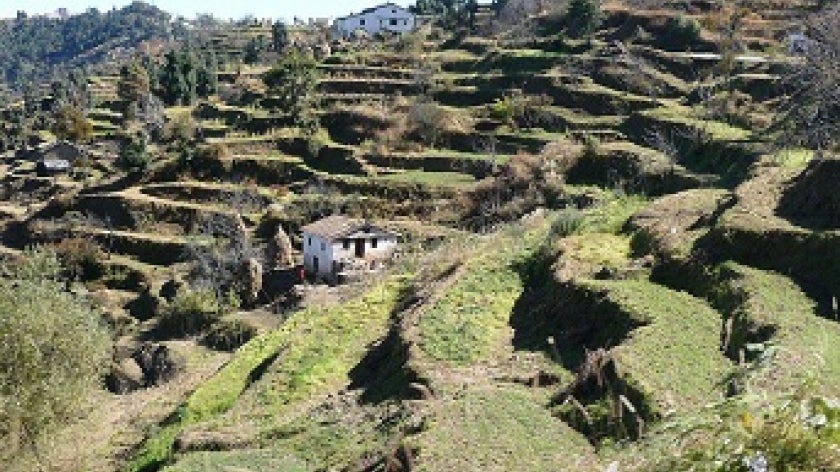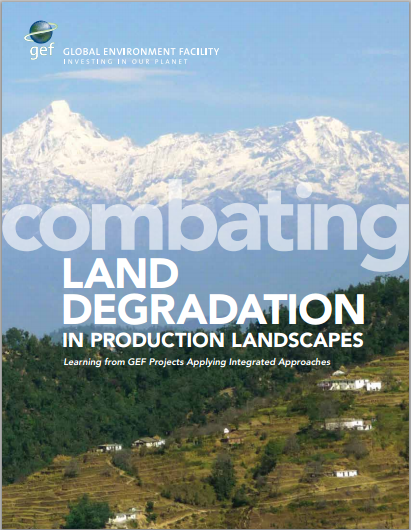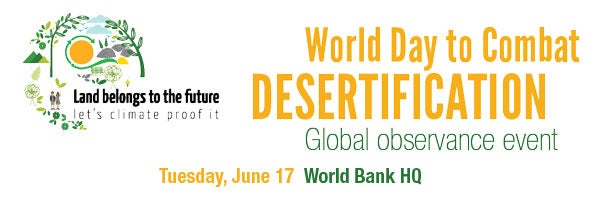
June 17th marks the World Day to Combat Desertification (WDCD).
In observance of the WCDC , this year the GEF is joining the UNCCD and the World Bank in an event in which high-level leaders and experts will engage on the human factors fueling ecosystem degradation and share solutions.
The event includes an opening ceremony, panel discussions, a concert, film screening, a networking lunch and a cocktail reception. The event will also be webcast live. Entry is free, however, pre-registration is required in order to get access to the Bank.

The report sheds light on of the GEF’s catalytic role in promoting integrated approaches in production systems within the Land Degradation focal area. The report also highlights:
- the context and rationale for GEF financing under OP12 and OP15
- the catalytic role of GEF financing in promoting integrated approaches, and
- lessons from the application of integrated approaches to combat land degradation.
 WDCD-event.jpg
WDCD-event.jpg

The event is organized by the United Nations Convention to Combat Desertification (UNCCD), and hosted at the World Bank in partnership with the Global Environment Facility (GEF), TerrAfrica and Connect4Climate.
Click Here to watch the replay of this event!
WDCD Event Agenda
9:00 9:30 – Opening ceremony
Welcome by Mahmoud Mohieldin, Corporate Secretary and President's Special Envoy
Opening remarks by Monique Barbut, Executive Secretary, UNCCD and Naoko Ishii, CEO, GEF
9:30-10:00 - Keynote addresses
H.E. Mr. Brigi Rafini, Prime Minister of Niger
H.E. Mr. Uahekua Herunga, Minister of Environment and Tourism of Namibia
10:00-10:10 - Land for Life Award
10:10-11:00 - Session 1: Greening Ethiopia’s Highlands: A New Hope for Africa
This session will be centered on a 10-minute documentary showcasing Ethiopia’s success in rehabilitating degraded lands.
11:00-12:30 - Session 2: Ecosystem-based Adaptation - Panel Discussion
This panel will explore ecosystem-based adaptation (EbA) and policy actions needed.
12:30-2:00 - Lunch Break in JDW Atrium
Exhibit in the Atrium with photos of desertification by George Steinmetz, National Geographic and Andrea Borgarello, TerrAfrica
SAWAP Exhibit in the Preston Lounge
GEF Book Launch on Production Landscapes
2:00-3:30 - Session 3: A Conversation on Drylands: Perspectives from Africa, LAC and the MENA
Preview of Award-wining documentary Solar Mamas telling the story of poor women seeking to become solar engineers followed by a panel discussion on the development challenges of drylands in Africa, Latin America and the Middle East.
3:30-4:00 - Closing remarks
4:00- 6:00 - Cocktail & Concert with Titi and her band from Senegal
GEF and Land Degradation
The GEF is the financial mechanism for the UNCCD with Land Degradation as one of its focal areas. The GEF works tirelessly on projects around the world to combat desertification and deforestation.
The GEF mandate with respect to land degradation, specifically desertification and deforestation, is to finance innovations that foster integration of natural resource components—land, water, and biomass—in production systems. This mandate is achieved through projects on sustainable land management, which enables land users—mainly smallholder farmers, herders, and pastoralists—to safeguard ecosystem services that underpin long-term productivity of the systems. If their livelihood needs are met, the risk of further degradation or deforestation of the fragile ecologies can be avoided.
The GEF has invested close to $1 billion in projects on sustainable land management, and has leveraged more than $4 billion in cofinancing. The financing mechanism responds to country demands, especially from dryland regions in Sub-Saharan Africa, the Middle East and North Africa, Asia, and Latin America. It also catalyzes adaptive and affordable opportunities and options for land users living in poverty. As countries increasingly seek to address multiple needs of these land users in an integrated manner, the experiences from existing GEF projects will become invaluable.